News Story
Remembrance Day, of course, is a day where we commemorate, where we celebrate the many lives lost in the armed forces that served in different conflicts, not just here in the UK, but in the commonwealth, and the rest of the world. It seemed to me to be an appropriate moment to select some films which help us look back on conflict. I've focused particularly on World War 2, often the greatest focal point of Remembrance Day, and also, in cinematic terms, the biggest source of content for British movies.
In fact, British war films are almost a sub-industry in themselves, going back to the time of the conflict itself, and, especially, the post-war period, when they were often the most popular released in the UK and sometimes around the rest of the world. They've continued to form a staple of what we call British cinema.
I've picked 5 movies I think are really interesting and diverse in terms of the way they reflect the conflict of World War 2, the majority of which are based on real life stories, and which have particular cinematic importance, as well as a particular importance to me.
I've chosen Powell and Pressburger's masterpiece A Matter of Life and Death from 1946; the famous Royal Navy movie The Cruel Sea, from 1953; the early 60s classic The Great Escape, perhaps the greatest prisoner of war movie ever made; Joe Wright's highly acclaimed and Oscar-winning 2017 movie, Darkest Hour; and, finally, a new movie released very, very recently, A Call to Spy, which Film London had some involvement with.
I hope you'll either discover these movies for the first time or be encouraged to rediscover them, and thereby reflect upon Remembrance Day in a different, movie context, one which I hope is appropriate and fitting.
Adrian Wootton OBE
Chief Executive of Film London and the British Film Commission
1. A Matter of Life and Death (1946) — dir. Michael Powell & Emeric Pressburger
Written and directed by the sublime team of Michael Powell and Emeric Pressburger, A Matter of Life and Death is a fantasy made immediately after the war, in 1946. It stars the rather wonderful David Niven as a bomber pilot who is supposed to die in a burning Lancaster, but is miraculously saved, somehow stranded between heaven and earth. He has to win a court case to stay alive, and get married to the sweetheart he meets as a result of not dying.
It's an extraordinarily original, brilliant fantasy film, which Powell and Pressburger actually built from a rather different movie they made during World War 2, One of Our Aircraft Is Missing, regarded as one of the great realist films made during the conflict itself. This film takes that one as a leaping off point into a completely different space.
I think this is David Niven's greatest performance. He was himself a war hero; he came back from Hollywood to serve in the army, and this was the first thing he did after the war, staying in England to make the film.
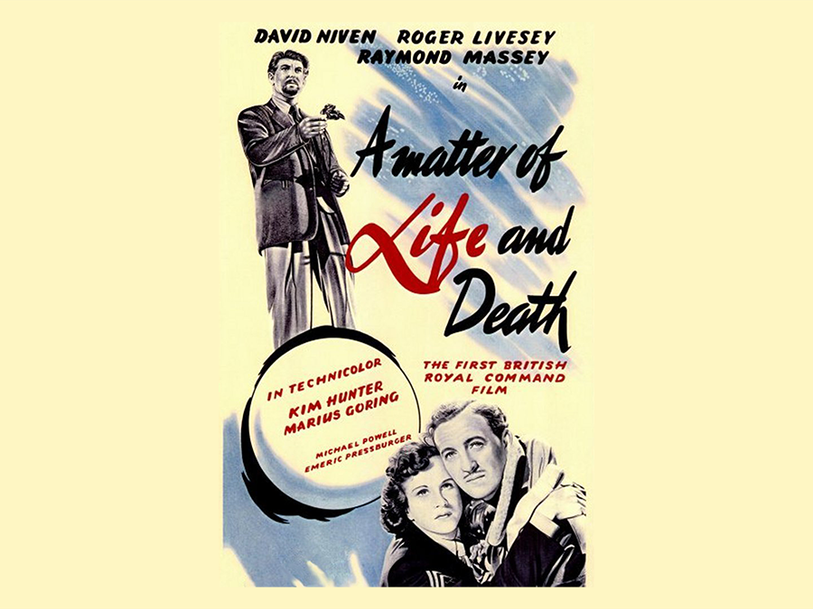
It's a film with complex moral and philosophical questions. It reflects the social change that was created by World War 2 and continued in the post-war era.
The opening moments, I believe, contain some of the greatest script lines in movie history, and the film is also famed for its extraordinary shifts between the technicolour of real life and the black and white of heaven. The combination of the colour palette, the wondrous acting, the incredible dialogue and the originality of the concept have meant that, while not a hit on release, the film is now recognised as one of the greatest of all time, and has been a massive influence on directors like Martin Scorsese. Indeed, Scorsese and Michael Powell became friends, and Powell's wife Thelma Schoonmaker has edited every Scorsese movies in the last 30 years.
A Matter of Life and Death is a wondrous movie, and one which also does very much reflect Remembrance Day. I hope you want to rediscover it, or, if you're incredibly lucky, watch if for the very first time. This is cinematic heaven.
Watch: Britbox (included with subscription)
2. The Cruel Sea (1953) — dir. Charles Frend
The Cruel Sea, made in 1953 about those working on cruiser convoys in incredibly difficult circumstances to protect shipping from German U-Boats, belongs to that tough, gritty, almost documentary-like tradition of the best of British war movies.
It's an incredibly believable film, and that comes in part from the fact that it's based on a book by Nicholas Monsarrat, who was himself a Naval Officer and experienced the hardship, privation and strife first-hand, and presented it in great authentic detail. This detail was reflected in the film by director Charles Frend, and helped considerably by the scriptwriting contribution of Eric Ambler. Ambelr was, in my opinion, one of our greatest contemporary writers - he was a thriller and espionage writer, and a great influence on people like John Le Carre, but also a noted screenwriter, who worked on a number of war movies both during and after the conflict.
I had the great pleasure of meeting Eric Ambler and talking to him about his life and work during one of his late, and possibly his last, live on-stage interviews at the National Film Theatre during the London Film Festival in 1996.
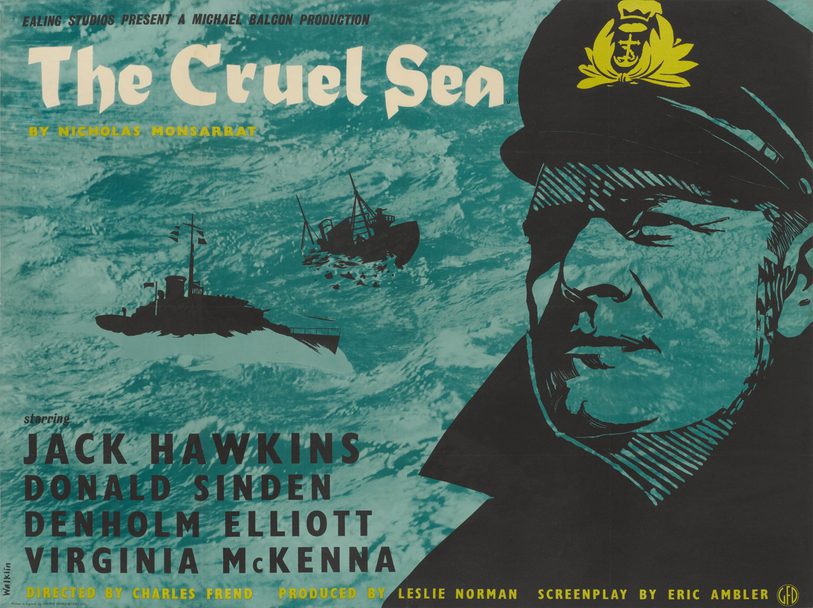
It's a wonderful movie with an incredible cast, led by Jack Hawkins. Hawkins, probably less familiar to contemporary viewers, was one the great British stars on the 1950s, and this is him at his toughest, most authentic best in what is a resonant, haunting, poignant movie about the real life circumstances sailors and officers faced in this terrible conflict.
It's a really fitting tribute to all in the Naval services who gave so much during World War 2, and stands up as one of the great, great British war films. I hope if you've never seen The Cruel Sea you'll take time to discover it - it really is one of the greats.
Watch: Amazon Prime (from £2.49)
3. The Great Escape (1963) — dir. John Sturges
The Great Escape, directed by John Sturges with an all-star cast, tells the true story of a group of allied prisoners of war who aimed to find a way to break out of a supposedly escape-free prison camp.
John Sturges came to The Great Escape trailing a lot of glory from a run of other movies, including The Magnificent Seven, and it's no surprise that a number of the cast from that movie were also featured in this one.
This is a true story, based on a book by Paul Brickhill, who was himself a prisoner of war, and went on to become something of a war biographer. He not only wrote the book on which this film was based, from his own experiences, but also Reach for the Sky, on the famous fighter pilot Douglas Bader, and later The Dam Busters, about the famous bombing raid.
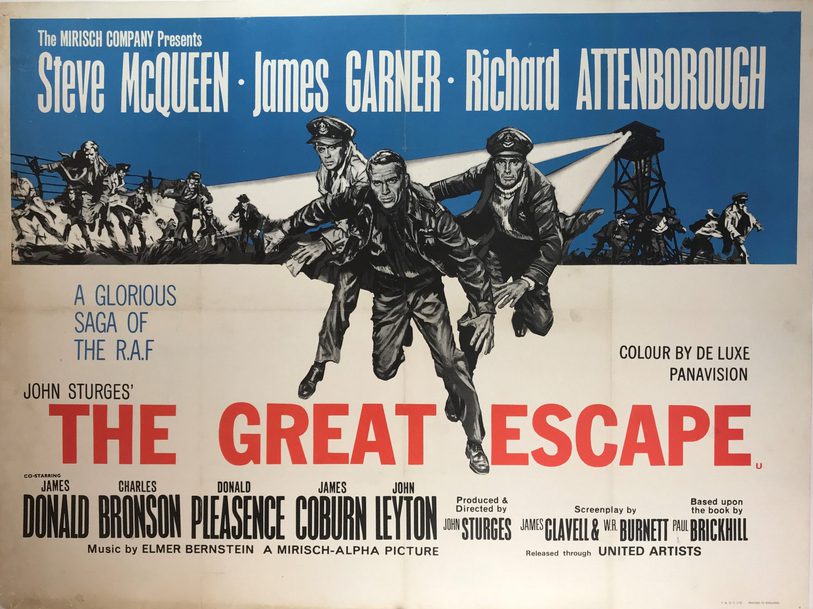
The Great Escape has an air of real authenticity while still being a big blockbuster adventure movie, something Sturges had a real flair for. It also reunited him with, among other cast members, Steve McQueen. For me, Steve McQueen was one of the great, great movie stars of the 60 and 70s, and he really comes into his own here.
Despite the wonderful contributions of James Garner and Richard Attenborough, this really is McQueen's movie. He doesn't steal the movie - he takes the movie, lock, stock and smoking barrel. He takes a traditional war movie and pushes it into the rebellious 60s through sheer force of will. I had the pleasure of meeting his great friend and Magnificent Seven co-star Robert Vaughn, who told me a lot of anecdotes about McQueen - including his battle to get more screen time, to inject more of himself into The Great Escape. He anchors the film, and makes it even more special than the dramatic story itself. It also led to one of the greatest cinematic sequences in movie history - the motorbike chase, the stunts for which McQueen did some of himself.
It's one of those movies that everybody of my generation used to watch at Christmas every year, and it became part of the fabric of our living rooms in the Christmas period. It also has an amazing soundtrack - a wonderful score by the genius that was Elmer Bernstein. The theme is one of the most instantly recognisable in cinema history, and was even later adopted by footbal crowds acrsoos the UK.
The Great Escape was a huge success, and is definitely part of our popular consciousness. It's adventurous, exciting, funny - but also reflects the real tragedy, violence and brutality of war.
It doesn't matter how many times you've seen it, The Great Escape is always worth seeing again for all of the many great things about it - but especially because of Steve McQueen.
Watch: Netflix (included with subscription)
4. Darkest Hour (2017) — dir. Joe Wright
Darkest Hour was made by the dynamic production company Working Title, responsible for so many fantastic British films over the last 30 years, and we at Film London have had the honour of working with them on many of these productions. It was directed by Joe Wright, a fantastically talented British director, whose Atonement I could have also picked, but I chose Darkest Hour for two reasons.
Firstly, I think that it reflects on a particular period of British history, a dark and threatening time which has some resonance in our current circumstances. Also, it reflects a particular personality; one of our great national figures, Winston Churchill. It does this in an amazing and imaginative way, in no small part due to the script by Two Popes writer Anthony McCarten, who has a real flair for film biography.
Darkest Hour shows a country at the edge of invasion, where everything is against the UK, and one that starts to unite, with a solidarity and unity of purpose. This understanding of what everyone was fighting for, and what sacrifices and to be made, is really poignant and haunting, but also inspiring, a message that is modern as well as old-fashioned.
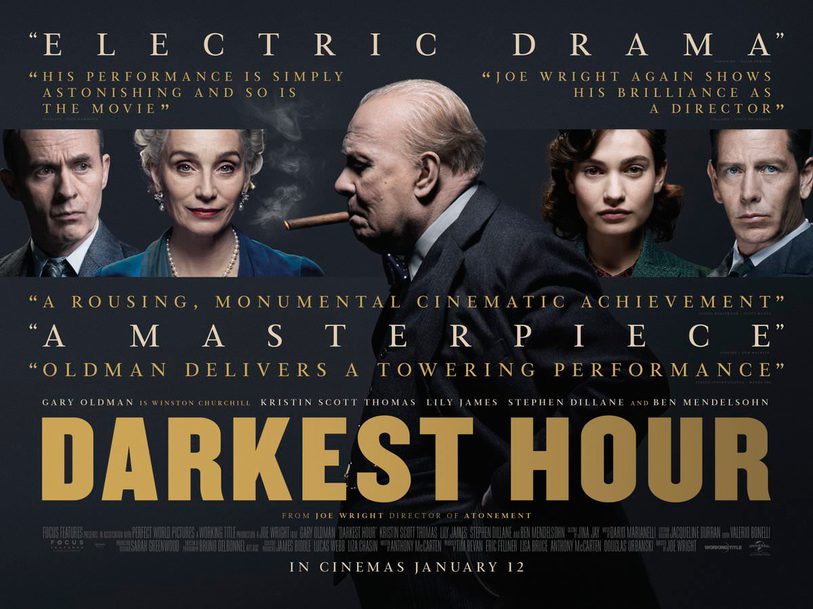
The characterisation of Churchill by Gary Oldman is frankly extraordinary. I've always been a huge fan of Oldman's - and thought he was robbed of winning an Academy Award for his performance in a previous Working Title film, Tinker Tailor Soldier Spy - and so I'd been waiting for him to have the opportunity to demonstrate again that he was one of the greatest actors in the world. He does that in style in Darkest Hour. His characterisation, his performance, his transformation as Churchill is truly amazing, and brought him just about every acting award on planet Earth, including the Academy Award.
I always get an enormous amount of pleasure in watching Darkest Hour, and I think this is a really fitting film to watch around Remembrance Day because of the spirit, the atmosphere, the sense of nation it conjures. In an entirely non-jingoistic way, it says something about being British that is important to hear, and emphasises the important link to those who gave so much in previous conflicts, and particularly in this case World War 2.
I hope you'll want to discover or rewatch Darkest Hour. It's one of Joe Wright's finest moments, and it's certainly one of Gary Oldman's.
Watch: Amazon Prime (from £2.49)
5. A Call to Spy (2020) — dir. Lydia Dean Pilcher
The most recent film I've selected is A Call to Spy, which was only finished last year, and has only just been released. The film was in the 2019 Breakthrough strand of London Screenings, Film London's annual export event celebrating and promoting UK films to the international market, so, in a small way, we helped the film on its journey to the success it's now enjoying at festivals, and being distributed around the around the world, so I'm delighted about that.
It's also very appropriate for Remembrance Day, telling the relatively little-known true life story of the incredibly brave young women who became part of the experimental early secret service agency, the SOE. They agreed to incredibly dangerous missions, being parachuted into occupied France to set up spy networks and sabotage the occupying German army.
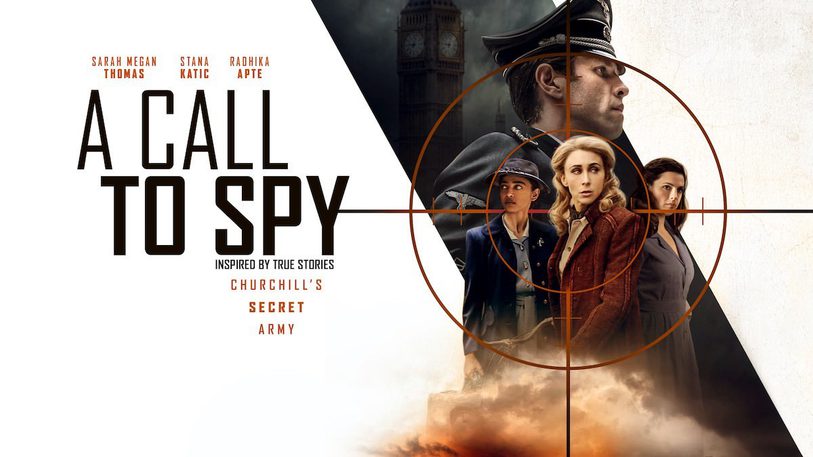
A Call to Spy focuses on a small group of women centred around Virginia Hall - played by writer-producer Sarah Megan Thomas - the incredibly brave American coordinator of the spy ring, among other important real life heroines, some of whom sadly didn't make it to the end of this terrible conflict.
One of these real life heroines was transported to the Dachau prison camp, somewhere I visited whilst in Munich a few years ago, where there is an exhibition commemorating the lives of some of those people, including one of the characters featured in this film.
A Call to Spy tells this story incredibly well. It's a powerful, moving, thrilling drama - and a really great achievement for an independent film. I heartily congratulate Sarah Megan Thomas for getting it off the ground.
Please do seek it out. I can't think of a more appropriate film that chimes with the sentiments and feeling of Remembrance Day. It really is a fitting tribute to these incredibly brave women from World War 2.